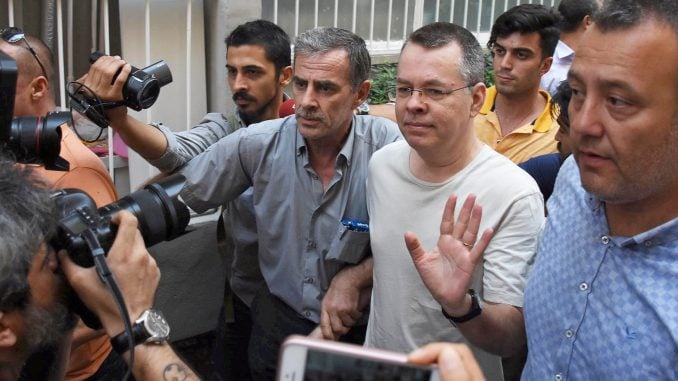
IZMIR, Turkey — When Andrew Brunson saw a police summons on his door in late summer 2016, the evangelical pastor from Montreat, N.C., thought it was a routine appointment to sort out his residency papers in Turkey, his home for nearly a quarter of a century.
He went to the police station on Oct. 7, 2016, was detained and later charged with involvement in a coup attempt. He is still in detention and is now at the center of a diplomatic row that has fueled Turkey’s most serious currency crisis for almost two decades.
“Obviously he was more than surprised” to be detained, Brunson’s lawyer, Ismail Cem Halavurt, told Reuters in an interview on Friday. Brunson has denied all the charges against him.
Brunson lived and preached in Izmir, a city on Turkey’s Aegean coast near some of the sites of Christianity’s first communities. At his first hearing in April, attended by Reuters, Brunson said he was “raising disciples for Jesus” in a country he deeply loved.
“I came to Turkey in 1993 to tell people about Jesus. I’ve never done something secretive in my time in Turkey.” Andrew Brunson
In July, after nearly two years in prison, Brunson was moved to house arrest. A court on Friday rejected an appeal to release him, saying evidence was still being collected and he posed a flight risk, according to a copy of the ruling seen by Reuters.
President Donald Trump has demanded Brunson’s unconditional release, describing him as a “great patriot hostage,” and has slapped sanctions and tariffs on Turkey which have helped push the lira currency to record lows.
Turkish President Tayyip Erdogan has linked Brunson’s release to the fate of Fethullah Gulen, a Turkish Muslim cleric living in the United States whom he blames for the July 2016 coup attempt. Erdogan has raised tariffs on U.S. cars, alcohol and tobacco in a tit-for-tat response.
“You have one pastor as well. Give (Gulen) to us… Then we will try (Brunson) and give him to you,” Erdogan said in a speech last September to police officers in Ankara. It is a suggestion Washington has dismissed.
The breakdown in relations between the two NATO allies has thrust Brunson’s case to international prominence and made the 50-year-old American the unlikely center of attention in a currency crisis that has shaken global emerging markets.
His indictment, interviews with his lawyer, and three trial sessions attended by Reuters show the accusations against Brunson center around support for separatist Kurds and connections with alleged coup plotters.
Prosecutors questioned why he traveled hundreds of miles from his church on Turkey’s western coast to the mainly Kurdish southeast interior, where the PKK is active.
Messages on his phones, travel details, testimony from his congregation and what the indictment refers to as three secret witnesses, codenamed “Prayer,” “Fire” and “Meteor,” were cited in evidence against him.
The indictment cites GPS data showing trips to Suruc, near the Syrian border, and the mainly Kurdish city of Diyarbakir, as well as a meeting in 2010 with a man described by one of the secret witnesses as a U.S. special forces soldier.
Brunson said his trips to Kurdish areas were to help refugees who had escaped war in neighboring Syria.
“I do not accept that I acted in accordance with PKK targets. … We wanted to convert Syrian refugees coming to Izmir. I do not differentiate between their ethnic identities,” he said.
“Prayer,” the secret witness, was quoted in the indictment as saying Brunson was linked to prominent suspected members of Gulen’s network.
Halavurt said the witness had failed to offer concrete evidence of any such connections.
Brunson was not in the country at the time of the coup attempt but returned soon afterwards, according to his lawyer. In a text message cited in the indictment, he said the coup attempt “was a shock.”
“We were waiting for some events that would shake the Turks — preparing the conditions for Jesus’ return. … I think the situation is going to get worse. We’ll win in the end,” said the message, which was dated July 21, 2016, and addressed to a fellow pastor, according to the indictment.
Brunson did not deny sending the message but said it had been misunderstood, the indictment said.
“WE DIDN’T KNOW HIM”
In the Alsancak district of Izmir where Brunson lived, a pharmacy owner described him and his wife as “quiet people.”
The owner of a boutique two streets from his home said she never met him. “I know everyone in this neighborhood and I had no idea these people lived here,” she said.
Turkey’s government says it was similarly unaware of Brunson until his case was raised by the U.S. consulate.
Foreign Minister Mevlut Cavusoglu said this month that the case was triggered by a criminal complaint filed by a translator who had worked for Brunson and denied that the pastor had been detained for use as a political pawn.
“What possible benefit could we get from this person,” Cavusoglu said at a meeting of Turkey’s ruling party in the southern coastal town of Alanya.
At a NATO summit in Brussels last month, Trump and Erdogan discussed Brunson. Trump thought he and his Turkish counterpart had agreed a deal to release the U.S. pastor, according to two U.S. sources.
Turkey has denied any such swap was agreed upon.
Erdogan had sought U.S. help to persuade Israeli authorities to release a Turkish woman being held in Israel, accused of ties to the Palestinian militant group Hamas. In exchange, Ankara would release Brunson, a senior White House official said.
Israel deported the Turkish detainee, Ebru Ozkan, on July 15 and later confirmed that Trump had requested her release. Ankara has denied ever agreeing to free Brunson in return.
Brunson’s transfer to house arrest 10 days later was deemed too little, too late by Washington, and a phone call between the two leaders on July 26 “did not go well,” according to the U.S. official.



